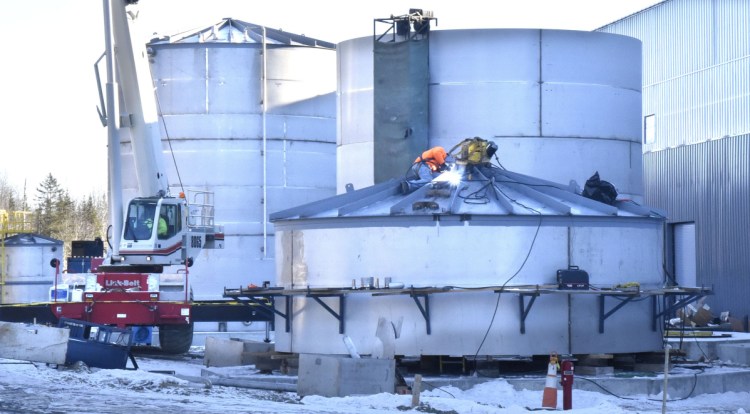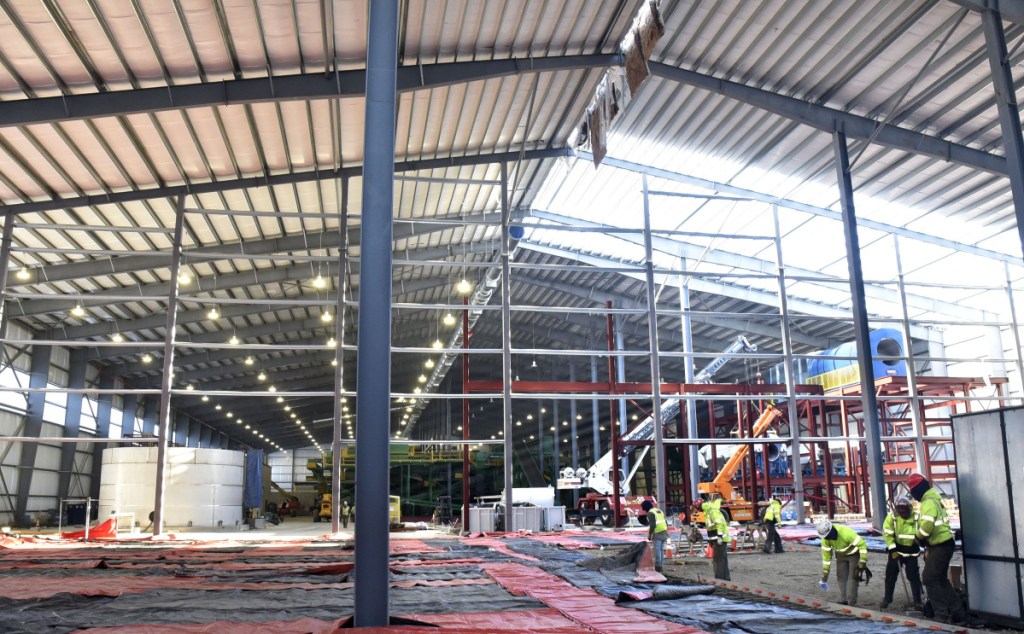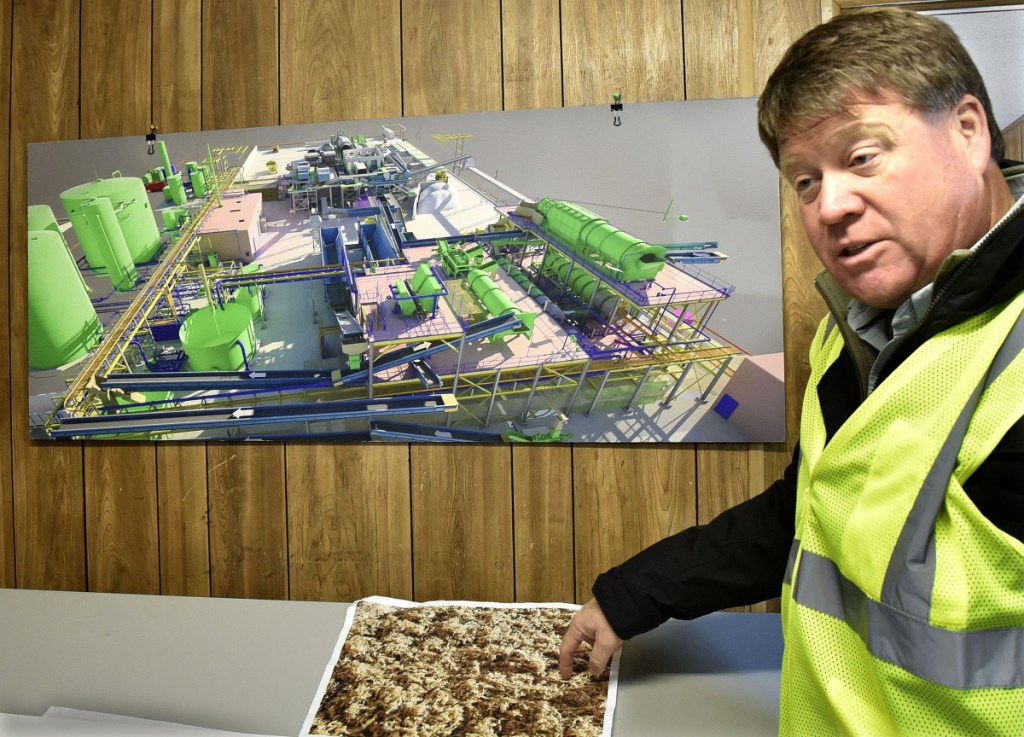HAMPDEN — Despite the construction of Fiberight Technology’s waste processing facility falling a year behind schedule, partnering towns will not have to shoulder extra costs for the delays. The Hampden plant is now due to open in April 2019 and ramp up to full capacity in June, according to Fiberight CEO Craig Stuart-Paul. Local officials remain hesitant to embrace the new timeline with full confidence, however.
Stuart-Paul said that the Maryland-based company will start advertising for about 40 plant management, operator and sorter positions next week.
Construction of the $69 million facility began in July 2017 with the goal of going live with the operation in April 2018. The project, which promises to divert garbage from landfills by turning it into energy, has been pushed back at least once before. Initially, it was expected to begin accepting trash in April 2018, then October 2018, and now April 2019. Stuart-Paul attributed the delays to harsh winter weather last year.
Once it’s fully operational, the 144,000-square foot facility is set to process the waste of 115 municipalities throughout the state that make up the Municipal Review Committee, or MRC, a number that has dwindled from over 180 in 2016. Advanced machinery will convert roughly 70 percent of incoming trash and 95 percent of incoming recycling into either biogas or cellulose, which can be used for fuel or to create paper pulp products like egg cartons and cardboard.
The MRC has spent at least $355,000 of a $1 million reserve fund to cover the costs associated with diverting its partner municipalities’ waste elsewhere since April, when the plant was supposed to open. George Aronson, a consultant to MRC from Commonwealth Resource Management, noted that the committee can expect to pay an additional $365,000 for these costs before the plant goes live.
Greg Lounder, executive director of the MRC, said that 50 of the 115 member towns currently receive reimbursement from the reserve fund for fees associated with hauling waste to landfills in Norridgewock or Old Town instead of the Hampden plant.
“It’s all geography-driven,” Lounder said. “We calculate the difference between trucking to Hampden and where they have to drop off (waste) now, and … cover those costs on a member-by-member basis.”
For the towns that don’t receive this compensation, the delay has not posed a large financial concern, though.
“You have to (pay to) take your waste somewhere anyway,” said Dennis Heath, manager of MRC-member town China.
Lounder said that the extra expenses, while frustrating, were expected.
“The delay was anticipated, planned for and reserved for,” he said. “But in best case scenario, it would have been nice to avoid having to use any of the reserve.”
Since the municipalities that compose the MRC had to enter new agreements with landfills this year to accept their waste until Fiberight opens, the committee has also agreed to issue $3 and $5 per-ton rebates to towns that have been charged increased tipping fees as a result of Fiberight delays.
The biggest obstacle, Lounder said, has been the prolonged wait.
“This has been a long, trying journey and we’re naturally very anxious to see the facility come into service,” he said. “We’ve waited a long time, and our patience on some days has been tested. It’s difficult when you have worked so long and so hard to see something come into service, and having to wait an extra number of months is just difficult on our collective patience.”
The MRC was on track to get the road leading to the plant approved as a public way by the Hampden town council on Monday, which would put the responsibility and cost of maintaining it through the winter on the town of Hampden. At an MRC board meeting on Wednesday, the group reported that if construction-related cars and trucks want to continue to park along that road, which is necessary in order to get the facility running as soon as possible, it will delay public approval. Fiberight has agreed to cover the costs of maintaining that road privately until construction is over, keeping it plowed so that the MRC doesn’t need to dip into reserve accounts for that.
Lounder said the street will eventually be called Harold Bouchard Way, named after the trucking business leader.
The facility’s plan to start serving individual communities is being kept under wraps.
Stuart-Paul said that over the course of three months, the facility will ramp up the quantity of waste it will accept, from 1,650 tons, roughly 20 percent capacity, in the first month, to 5,000 tons, or about 63 percent, in month two and the full amount of 7,900 tons in the third month. While Fiberight spokeswoman Shelby Wright said the company has “high confidence that Month One is April,” Lounder expressed that MRC board members instructed Fiberight to keep the month names numbered one, two and three rather than April, May and June until the company could prove to them that those dates were reliable.

Fiberight Corp. CEO Craig Stuart-Paul speaks about progress at the solid waste processing and recycling facility under construction in Hampden on Thursday.
Wright said the company has determined which towns it wants to bring on in each round but would not disclose that information.
“We won’t be releasing publicly the list of towns and the order they’re going to be on-boarded because we’re going to be talking to the towns independently,” said Wright. “The methodology we’ve used to develop (it) contains so many factors: delivery methods, days they deliver, tonage, proximity to facility.”
“We’re laser focused on providing the services we said we were going to provide as quickly as we can,” she added.
Meg Robbins — 861-9239
Twitter: @megrobbins
Send questions/comments to the editors.




